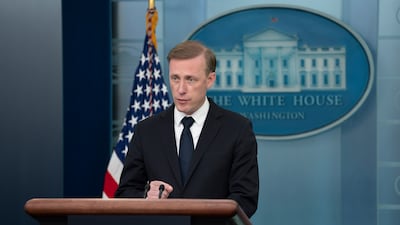White House National Security Adviser Jake Sullivan said Washington's commitment to the Middle East remains "unshakeable", in comments welcomed by the UAE's ambassador to the US on Friday.
Speaking at the Washington Institute for Near East Policy, Mr Sullivan said he was heading to Saudi Arabia this weekend, when he would also meet with representatives from the UAE and India.
"Our commitment to the Middle East region is unshakable because the region is vitally important to our shared future, and deeply interwoven with American interests and those of our allies and partners," Mr Sullivan said in a speech that also underscored Washington's focus on countering any threats from Iran or Iran-backed militias.
"The United States will proactively deter threats, defend our people in our interests and support the defence of our partners in the region, period, full stop."
The UAE embassy in Washington tweeted a message from Yousef Al Otaiba, the UAE's ambassador to the US, who said ongoing support from Washington in the Middle East was vital.
"The UAE is leading on a forward-looking opportunity agenda for the region. Sustained US support is critical to success. The US benefits too in trade, stability and ideals," he said.
Mr Sullivan is expected to meet Saudi Crown Prince Mohammed bin Salman, AP reported, citing a person familiar with the travel plans.
“This weekend, I will be in Saudi Arabia for meetings with its leadership,” Mr Sullivan said.
"My UAE and Indian counterparts will come to Saudi Arabia as well for meetings so that we can discuss new areas of co-operation between New Delhi and the Gulf, as well as the United States and the rest of the region, fuelled in part by the Comprehensive Economic Partnership signed last year between India and the UAE."
Mr Sullivan reiterated the US position towards Iran's atomic programme, saying the US will “take the necessary action to ensure that Iran does not acquire a nuclear weapon”.
Saudi Arabia and Iran began normalising relations earlier this year in a surprise China-brokered deal that saw them inch towards opening embassies in Tehran and Riyadh.
Mr Sullivan also said the conflict in Yemen would be “a significant topic” during discussions at the weekend, praising the parties for working on a “road map to ultimately bring the war to an end”.
Yemen has been witness to several milestones in its eight-year war, with Saudi Arabia's ambassador to Yemen landing in Sanaa and negotiating with the Houthis during an almost week-long trip.
Another key event was an 877-person prisoner exchange among the warring sides with a similar swap set to take place on May 15.
Mr Sullivan, who is President Joe Biden's top aide on national security matters, has been closely involved in Middle East issues and stressed Washington's firm commitment to the region, using a strategy he said was both “realistic and pragmatic”.
He said the strategy was based on “five basic elements: partnerships, deterrence, diplomacy and de-escalation, integration and values”.
Agencies contributed to this report

